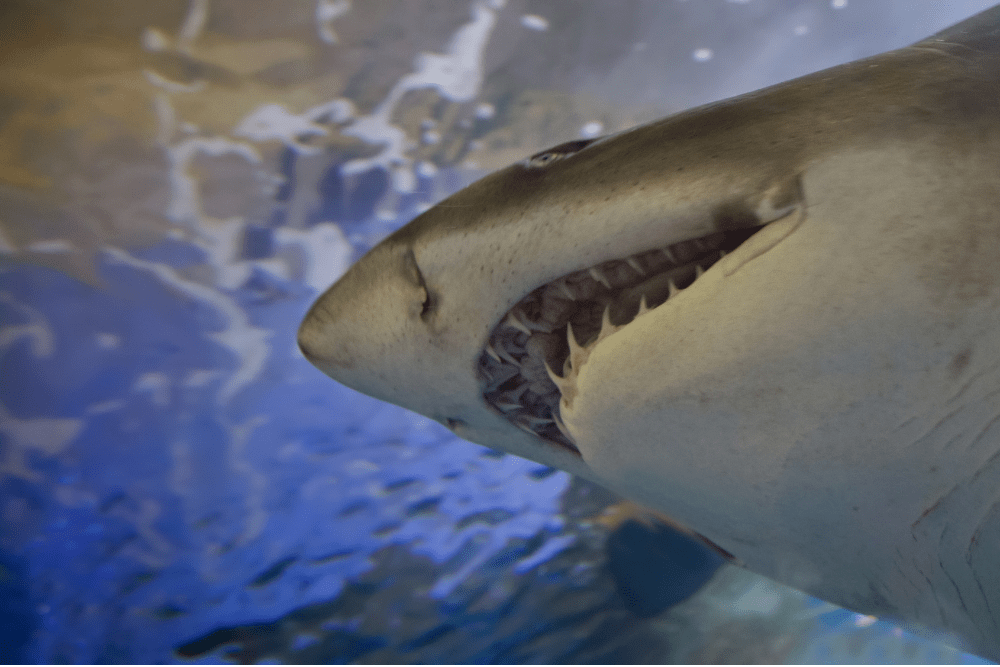
Every day I get emailed news alerts from around the world on a variety of subjects, such as birth; midwives; obstetricians; caesarean and VBAC. As the Australian College of Midwives National Media Spokesperson, I want to be ready for any potential political ripple in the waters of childbirth. I want to jump on the latest piece of research and be prepared when bad news stories hit. To be forewarned as they say is to be forearmed.
An alert came into my Inbox that disturbed me deeply – it was the story of a shark. What was a news alert about a shark doing mixed up with all my childbirth media, you may well ask? The answer is that this shark had supposedly had a caesarean.
The story was originally reported in the New Zealand Herald, but before long had become an international story. Two days following the breaking of the story it was reported in 93 articles ranging from the UK Daily Mail to the China Sun.
The first news report headline was, ‘Sharp-toothed shark acts as midwife’ (New Zealand Herald 10th November 2009).
Note the word midwife in the headline. This news alert landed in my Inbox under the ‘midwife’ search term I have programmed in through Google Alerts.
“Visitors to Kelly Tarlton’s Underwater World [New Zealand] were stunned to see one shark give another shark an impromptu caesarean section. Staff were initially dubious when visitors came running to tell them there were baby sharks spilling from a wound in a female school shark’s stomach – courtesy of a large bite by another shark. But they found a female with a large gaping stomach wound and four babies swimming in the tank. Kelly Tarlton’s aquarist Fiona Davies said it was common for sharks to take chunks out of each other, even in the wild, but she had never heard of anything like this.
“It had to bite a certain part to let them out and do it without killing them [the babies] or her [the mother].” Ms Davies said the unusual delivery had probably saved the baby sharks’ lives. Staff did not know the mother was pregnant and, had she given birth naturally, most likely at night, the babies would have been eaten by adult sharks and stingrays before staff could rescue them. The young sharks have been taken to a “nursery” tank with some baby eagle rays, where visitors can see them before they are released into the wild” (New Zealand Herald 10th November 2009).
The next day the UK Daily Mail read, ‘Shark performs grisly Caesarean on another in front of stunned aquarium visitors’ (UK Daily Mail, 11th November 2009). This news alert landed in my Inbox under the ‘caesarean’ search I have programmed in through Google Alerts. After this the news mutated into nearly 100 articles around the world – most now had the word caesarean in the title.
So why did this story catch my attention?
There were three reasons. The first was how the original story from New Zealand reported the incident as a shark acting as a midwife but from then on it was seen as performing a caesarean. This I wondered because the story originated from New Zealand where 78% of women choose midwifery care. The second reason this story intrigued me was the fact that a shark bite was portrayed as performing a caesarean. The third fascinating aspect was the way this was viewed as saving the shark pup’s life.
Sharks hold a morbid fascination for us.
In the 1960s a study was done that sought to determine which single word has the greatest psychological impact on people. Researchers tested a variety of words and it was the word shark that elicited the greatest fear response (De Becker, 1997). The reality is that humans are far more dangerous to us than sharks. Your chance of being killed in a shark attack is 1: 280 million. This means you would have to swim in the ocean 112 times a day for it to become as dangerous as making a single car journey to the supermarket (Harvard Centre for Risk Analysis, 2009).
So why do we fear something so much when we have so little chance of being attacked, let alone killed by it? De Becker argues in his book The Gift of Fear that the seeming randomness of their strike is part of it. So it is the lack of warning and the fact that such a large creature can approach silently and separate the body from the soul so dispassionately. De Becker argues, to the shark we are without identity, we are no more than meat and to human beings, the loss of identity is a type of death all by itself (De Becker, 1997).
As cold unpredictable animals, how then should we expect them to act?
I would think coldly and unpredictably. So why then when a shark in an aquarium turns on another pregnant shark and bites it in the stomach do we turn it into a drama about birth as we view it in our current culture and what does it reveal about how we view birth? Is natural birth as risky and caesarean as life-saving? Sharks are unpredictable – they don’t plan and calculate their moves and precisely bite another shark in the region of their reproductive organs in order to extract their babies.
The aquarist said herself in the interview, “it was common for sharks to take chunks out of each other.” What follows, however, is fascinating – the aquarist said, ‘the unusual delivery had probably saved the baby sharks’ lives… had she [shark] given birth naturally, most likely at night, the babies would have been eaten by adult sharks and stingrays before staff could rescue them.” Change a few keywords and this rhetoric is frighteningly familiar in the current context of childbirth.
There are several important points that have been forgotten in this story.
Firstly, the sharks are not in their natural environment. There is nothing natural about an aquarium. Secondly, mothers gave birth to their shark pups with a full set of teeth and were ready to take care of themselves. The pups quickly swim away, even from their mothers who might eat them. Shark pups have even been known to eat their own brothers and sisters in utero! Sharks, however, have been around for 400 million years and predate the dinosaurs by nearly 200 million years, so they must be doing something right! Thirdly, the presumption that the shark bite on the mother had saved the shark pups’ lives is quite bizarre.
Shark pups are most at risk because they are being born in an aquarium with all their natural predators confined. Fourthly, the subtle reference to the shark bite as a surgery that saved the shark pups’ lives compared with the danger of natural birth is chillingly familiar. As midwives, we hear this story daily in our work and we don’t buy it. Well, I don’t buy this story either. The bottom line here is this – a shark bit another shark in the stomach just as sharks do! That other shark happened to be pregnant and it happened during visiting hours so there happened to be witnesses. So why do we turn this into a story of how a caesarean section saved shark pups’ lives? I’ll leave you to answer that worrying question.
References
- www.nzherald.co.nz/nz/news/article.cfm?c_id=1&objectid=10608530
- www.dailymail.co.uk/news/worldnews/article-1226925/Shark-performs-grisly-Caesarean-stunned-aquarium-visitors.html
- De Becker, G. (1997). The Gift of Fear. London: Bloomsbury
- Harvard Centre for Risk Analysis. (2009). Risk Quiz Test www.hcra.harvard.edu/quiz.html
Page revised on 13th December 2021


Recent Comments